
 |
|
|
|
In Steve Spielberg's occasionally amusing Catch Me If You Can (2002) is a scene that wants to be classic but falls flat on its face. Inveterate thief and imposter Frank Abagnale (Leonardo DiCaprio) takes a look through the large picture window and just happens to witness an entire Christmas scene with a 'normal,' happy family. It plays out like a vision from an old Kodak commercial. Spielberg makes sure that it's pumped up with a camera move and a music cue. It communicates what Frank is missing in his life, but it's also a painfully contrived, optimized imitation of something older, perhaps one of the versions of Stella Dallas or a show by Douglas Sirk. The corresponding scene in Carol Reed's Odd Man Out is just three short cuts. The blood-drained Johnny McQueen (James Mason) lies hiding in the James Joyce-like Irish snow, under a Belfast house front. A light comes on and he looks up at a window. Two apple-cheeked little boys smile out at the falling snow, just for a second. Perhaps Johnny thinks he's seeing yet another delirious vision; maybe these nice, un-'troubled' kids are the innocents he was talking about when he quoted Corinthians earlier that afternoon.
Odd Man Out is rightly hailed as a masterpiece of British film, which is interesting because it neutralizes a touchy political subject for its time, IRA resistance in Northern Ireland. Scholar John Hill (in the disc extras) tells us that Irish resentment of England during the war was such that some rebel factions felt kinship with the Nazis, a situation given a much more topical slant in the Deborah Kerr thriller I See a Dark Stranger, and even the later The Man Who Never Was. In this postwar story neither the IRA nor Belfast is called by name. Reed's final script is instead a lofty tragedy about The Human Condition, wearing its messages on its sleeve. Local leader of "The Organization" Johnny McQueen mutters about wishing everyone could reject violence, as one of the "childish things" that no longer have a place in civilized society. When circumstances turn him into a near-literal Dead Man Walking, we experience his last agonizing hours as a surreal, absurd ordeal. 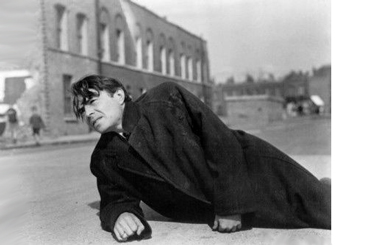
Johnny McQueen preps his gang for a payroll robbery at a mill. His most responsible cohort Dennis (Robert Beatty) wants to take his place, as Johnny, a prison escapee, has been in hiding in one room for almost year. Everything goes wrong when Johnny goes faint out in the light and wide-open space. He kills a man who wounds him and, thanks to his cowardly getaway driver Pat (Cyril Cusak) falls out of the car and is left behind. Bleeding badly, he stumbles into a disused air raid shelter. Dennis goes out on his own to find Johnny, while Pat takes the other foolish thieves to eat and drink at the home of Theresa O'Brien (Maureen Delaney), a s suspected informer. Young Kathleen Sullivan (Kathleen Ryan) has been taking care of Johnny for a year and is in love with him; she also goes out to search but is soon shadowed by a shrewd police inspector (Dennis O'Dea). With the idea of spiriting Johnny away for herself, Kathleen arranges to sneak him on board a departing ship. Meanwhile, Johnny has made contact with a cabbie (Joseph Tomelty), and been found by the opportunistic Shell (famed Irish performer F.J. McCormick), who goes to local priest Father Tom (W.G. Fay) for advice -- he wants to turn Johnny in for a reward. Shell rooms with Lukey (Robert Newton), an alcoholic artist trying to paint the soul of a man in extremis -- and who finds in the delirious Johnny the perfect model. 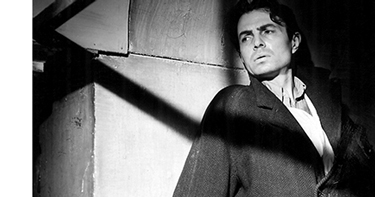
Odd Man Out has just one joke -- at least I think it's a joke. Kathleen rushes into a dance hall where a crowd is jitterbugging like crazy, just below a big, stern sign reading, 'No Jitterbugging.' The balance of the picture is as perfect a sustained piece of sober art filmmaking as one can imagine. Let David Lean make Dickens adaptations and melodramas starring his wife -- Carol Reed's next three 'thrillers' aspire to compete at the big continental film festivals. The drawn-out fate of Johnny McQueen, stumbling through the mean streets as the snow begins to fall, is happily not given a religious context. There are no compositions comparing him to the Christ walking the Via Dolorosa. We instead experience a man suddenly, utterly alone. Some of the characters want to profit from him, while a publican (William Hartnell) just wants him away from his business. A pair of Good Samaritan ladies give him a chance to rest and get warm, but he won't stay. Anybody helping him is an accessory; anyone hurting him may face retaliation by the feared 'Organization.' The faithful rebel Dennis tells Kathleen that Johnny will always belong to The Organization, and then risks his life to save him. The other, far less reliable rebels are easily rounded up. Kathleen commits her heart and soul to saving a man who is not yet her lover. Father Tom tells her to just have faith and stay out of it. Kathleen's love is such that she goes willingly into amour fou territory, defying the cruel universe in the name of Love. 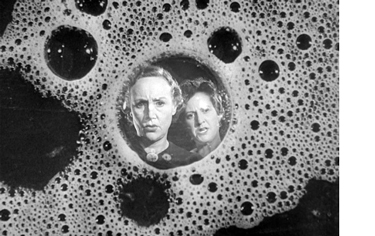
The movie begins as a naturalistic, almost neo-realist caper picture and as night falls veers into expressionism, with surreal touches. The visuals express Johnny's mental state as soon as he steps outside and is made dizzy by the brightness of blatant reality. Handheld shots out the car window show his disorientation and a fog effect shows him losing concentration, leading to a struggle with guns in the middle of a vertigo episode. Later on, the half-frozen Johnny is seemingly able to function only because he's unaware how badly he needs a transfusion. He's led about Belfast by a number of people, for various reasons. Frightening special effects show him seeing faces of talking people in bubbles of beer on a bar table. Lukey's studio distorts into a twisted, Polanski-style tunnel, as portraits on the walls float forward to stare at him. The filmmaking is so expert that it doesn't matter that characters are making speeches about morality, or the meaning of faith; they're all seriously impacted by Johnny's plight. Robert Newton's crazed artist should be an embarrassment but is instead the dramatic asset that pushes Odd Man over the top into greatness. Lukey's egotistic obsession to capture something transcendent in his paintings is a human quest no less extreme than Johnny's vain struggle for political revolution. Lukey's aim is selfish, but the rebels are equally ruthless when they send idealistic young patriots into battle for their cause. Odd Man Out can be called 'Brit noir', but is of course on its own evolutionary tree, influenced by other film movements. An iron fence separates Kathleen and Johnny from freedom and happiness. Theirs is a highly romanticized fate, unlike the cosmic obliteration that visits the lovers and loners in nihilistic American noirs like Criss Cross or Night and the City. 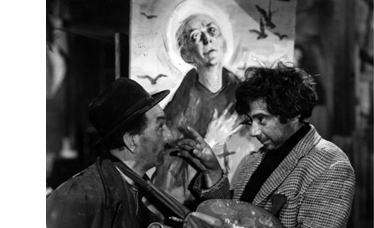
James Mason's world-class performance makes Odd Man Out like a book one can't put down. The rakish matinee idol expresses the helplessness of a man wracked by guilt and suddenly alienated from everyone he meets. He never overplays as he drifts in and out of a disoriented fog. After this movie Mason almost immediately made his jump to Hollywood. Robert Newton was becoming famous (infamous?) around this time as well, stamping a big impression on the American consciousness three years later as Long John SIlver in the Disney/Byron Haskin Treasure Island. Seen in a small role here, the talented Dan O'Herlihy never became a major star. But he almost immediately drew attention in Welles' Macbeth and was nominated for an Oscar for Luis Buñ,uel's Las aventuras de Robinson Crusoe. He made dozens of memorable movies, the best-known being 1987's RoboCop. The unsung star of Odd Man Out is given the lowest on-screen billing. Kathleen Ryan's heroine is as soulful as women come, silently suffering for her man. She played much the same role in two notably subversive movies of the period, Edward Dmytryk's communist Give Us This Day (Christ in Concrete) and Cy Endfield's ferocious The Sound of Fury (Try and Get Me!). Ms. Ryan looks both very Irish and incorruptibly loyal; in some of the production stills with James Mason, she begins to suggest the Pietà. I haven't seen 1947's Captain Boycott, where she plays the love interest of yet another oppressed Irish patriot. 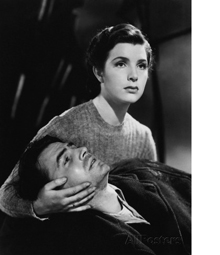
The Criterion Collection's Blu-ray of Odd Man Out is a picture-perfect restored B&W encoding of the revered English classic. Robert Krasker's stylized lighting looks luminous, showing off the clever stage sets that place convincing forced-perspective cityscapes behind many of the stage exteriors. The Dubliners- like ship that waits to take Johnny away appears to be a large 2D cutout. William Alwyn's dramatic score begins under the censor's card, and hits a cymbal crash right on the Rank Film 'gong' logo. Disc producer Curtis Tsui has assembled some excellent extras. Scholar John Hill gives an expert reading of Odd Man Out from a historical and political perspective, and a new featurette entitled Postwar Poetry is stylish and informative. Music scholar Jeff Smith gives us a detailed analysis of Alwyn's music, and a 1972 documentary about James Mason visiting his hometown tells us a great deal about the fine actor. A Suspense radio version of the show from 1952 stars Mason and Dan O'Herlihy. The fanfold insert contains a compelling essay on the movie by Imogen Sara Smith, the author of books on film noir and Buster Keaton. If you want a serious deep-dish classic about cruel irony in a violent world, Odd Man Out is an excellent contender. 
On a scale of Excellent, Good, Fair, and Poor,
Odd Man Out Blu-ray

The version of this review on the Savant main site has additional images, footnotes and credits information, and may be updated and annotated with reader input and graphics.
Review Staff | About DVD Talk | Newsletter Subscribe | Join DVD Talk Forum |
| ||||||||||||||||||